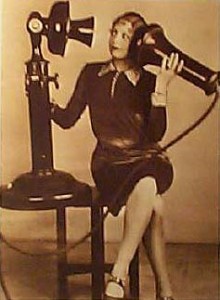 I’m happy people use cell phones and BlackBerrys non-stop. It distracts them the way shiny necklaces distract monkeys, and they have less time to try to stab me in the head with a box cutter. But Jonathan Franzen isn’t so sanguine about the intrusion of cell phones into public space. From his new essay (free registration required) on the topic in Technology Review:
I’m happy people use cell phones and BlackBerrys non-stop. It distracts them the way shiny necklaces distract monkeys, and they have less time to try to stab me in the head with a box cutter. But Jonathan Franzen isn’t so sanguine about the intrusion of cell phones into public space. From his new essay (free registration required) on the topic in Technology Review:
“The technological development that has done lasting harm of real social significance–the development that, despite the continuing harm it does, you risk ridicule if you publicly complain about today–is the cell phone.
Just 10 years ago, New York City (where I live) still abounded with collectively maintained public spaces in which citizens demonstrated respect for their community by not inflicting their banal bedroom lives on it. The world 10 years ago was not yet fully conquered by yak. It was still possible to see the use of Nokias as an ostentation or an affectation of the affluent. Or, more generously, as an affliction or a disability or a crutch. There was unfolding, after all, in New York in the late 1990s, a seamless citywide transition from nicotine culture to cellular culture. One day the lump in the shirt pocket was Marlboros, the next day it was Motorola. One day the vulnerably unaccompanied pretty girl was occupying her hands and mouth and attention with a cigarette, the next day she was occupying them with a very important conversation with a person who wasn’t you. One day a crowd gathered around the first kid on the playground with a pack of Kools, the next day around the first kid with a color screen. One day travelers were clicking lighters the second they were off an airplane, the next day they were speed-dialing. Pack-a-day habits became hundred-dollar monthly Verizon bills. Smoke pollution became sonic pollution. Although the irritant changed overnight, the suffering of a self-restrained majority at the hands of a compulsive minority, in restaurants and airports and other public spaces, remained eerily constant. Back in 1998, not long after I’d quit cigarettes, I would sit on the subway and watch other riders nervously folding and unfolding phones, or nibbling on the teatlike antennae that all the phones then had, or just quietly clutching their devices like a mother’s hand, and I would feel something close to sorry for them. It still seemed to me an open question how far the trend would go: whether New York truly wanted to become a city of phone addicts sleepwalking down the sidewalks in icky little clouds of private life, or whether the notion of a more restrained public self might somehow prevail.
Needless to say, there wasn’t any contest. The cell phone wasn’t one of those modern developments, like Ritalin or oversized umbrellas, for which significant pockets of civilian resistance hearteningly persist. Its triumph was swift and total. Its abuses were lamented and bitched about in essays and columns and letters to various editors, and then lamented and bitched about more trenchantly when the abuses seemed only to be getting worse, but that was the end of it. The complaints had been registered, some small token adjustments had been made (the ‘quiet car’ on Amtrak trains; discreet little signs poignantly pleading for restraint in restaurants and gyms), and cellular technology was then free to continue doing its damage without fear of further criticism, because further criticism would be unfresh and uncool.”
Tags: Jonathan Franzen
